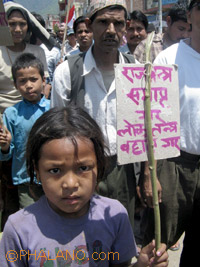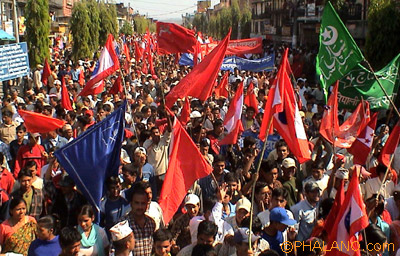Nepal og fremtiden

Som supplement til det sidste indlæg faldt jeg over denne leder i The Kathmandu Post, som forklarer sit syn på det internationale samfunds rolle i konflikten:
Currently, Nepal stands at a crossroads. On the right side of it is a new Nepal where people are fully sovereign; insurgency is resolved and the Maoists join the political mainstream; the state is restructured to accommodate the disfranchised populace; and the society makes a peaceful transition towards prosperity. On the wrong side of it is the status quo, where the fundamental issue of sovereignty remains unresolved; the Maoist insurgency continues; state, under the direct control of the king, remains unitary and unwilling to address the issue of widespread exclusion. As Nepal has entered the final stage of the labor pain, the international community, unfortunately, seems to be supportive of the status quo. The international community's euphoric reaction to Friday's royal address is ludicrous, to say the least. It also shows how shallow is their reading of Nepali history and how far removed they are from the present ground reality. The foreign envoys' suggestion to the parties to break with the rebels and to take the royal offer is fraught with two serious problems.Og på den baggrund kan det vel ikke undre, hvis såvel støtten til kongens "venlige tilbud" om en eller anden form for demokratisk vinduespynt som tilliden til udlandets forståelse for, hvad der foregår, er på et nulpunkt lige for øjeblikket.
First, it does not address the Maoist insurgency, the main problem of the day. Breaking with the Maoists at this point in time and rejecting their legitimate demand for a constituent assembly means more bloodshed and more chaos for several years to come. Second, it denies the Nepali people their sovereign rights to decide --- through peaceful means --- the future of monarchy. Between three to four million people, who have already hit the streets nationwide, demanding the election to the constituent assembly, didn't suddenly wake up one fine morning and said that they wanted to do away with the monarchy. These people have a painful memory of thier history where monarchy has played, time and again, with Nepali people's democratic aspirations. King Tribhuvan failed to live up to his promise of constituent assembly elections in the 1950s. Then, King Mahendra dismissed the first democratically elected government in December 1960. King Birendra gave in to the demands of democracy only after dozens of Nepalis shed blood in 1990. Again in 2004, King Gyanendra sacked the elected government and in 2005 seized absolute power, jailed the political leaders and gagged the press.
(...)
The most unfortunate failure of the international community has been their inability to see the courage and democratic aspirations of the Nepali people. This is a country marred by a violent insurgency. Yet during the last two weeks, millions of Nepalis have come to the street rejecting violence. They have braved bullets, baton charges and tear gas shells but have refrained from violence. What is the message of the international community to these peaceful protestors? Are they going to say, "No you can't meet your demands through peaceful protests?" Are they going to say, as the Maoists advocate, that armed revolution is the only answer to the Nepali state's violence?
Kongen overvejer på sin side at indføre undtagelsestilstand - et læserbrev i samme avis gruer for konsekvenserne:
I am in a state of awe and shock after hearing the news in Indian channels that the king is mulling over declaring a state of emergency as the last resort to contain the ongoing peaceful movement to restore democracy and people’s right. But will he be able to contain the mass agitation that has turned against his rule? The curfew has only added fuel to the ongoing agitation. The royal declaration has infuriated the people and now they are demanding nothing less than a republic.
Any one can guess that the intention behind declaring a state of emergency is to stiffle the press freedom and detain the political leaders. The king neither has delivered the needs of the people nor has he resolved the decade old insurgency. What he has done is that he has reversed the political system and turned against the people. We are well aware of the fact that the country is undergoing a major social and political transformation. The young people on the streets are ready to fight for their rights to build a new Nepal. They will defy emergency just as they have defied the shoot at sight curfew and will contunue their ongoing movement unless their desired destination is achieved. Therefore, for the king, imposing a state of emergency will be committing sucide. If the king does not revive the dissolved parliament and let the people resolve their problems themselves, then the country will witness more bloodshed in the days to come.

Vel, det får vi jo så lige netop se - i de følgende dage. Lad os håbe, Kathmandu Posts lederskribent har ret i, at alting vil ordne sig, hvis blot kongen vil indse sit nederlag.
